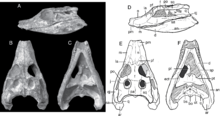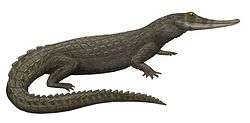Shamosuchus
| Shamosuchus Temporal range: Late Cretaceous, 85–74 Ma | |
|---|---|
| | |
| Holotype specimen | |
| Scientific classification | |
| Kingdom: | Animalia |
| Phylum: | Chordata |
| Class: | Reptilia |
| Superorder: | Crocodylomorpha |
| Family: | †Paralligatoridae Konzhukova, 1954 |
| Genus: | †Shamosuchus Mook, 1924 |
| Species | |
| |
Shamosuchus is an extinct genus of neosuchian crocodile that lived during the Late Cretaceous (Santonian-Campanian) period in what is now the Gobi desert of Mongolia, approximately 85 to 74 million years ago.
Paleobiology

The eye and nasal openings were not raised above the skull as in modern crocodilians, so that the animal would have to raise its head completely out of the water to breathe. As this cranial morphology does not suit an ambush predator, it lends support to the idea of a diet of aquatic invertebrates. The teeth were adapted to crush bivalves, gastropods and other animals with a shell or exoskeleton. The genus was named in 1924 by Charles C. Mook.[1]
Paralligator was synonymized with Shamosuchus by several authors,[2][3][4] However, recent cladistic analysis of Paralligatoridae found Paralligator distinct from Shamosuchus.[5]
References
- ↑ Mook, C. C. (1924). "A new crocodilian from Mongolia". American Museum Novitates. 117: 1–5.
- ↑ Efimov, M. B. (1983). "Review of fossil crocodiles of Mongolia". Transactions of the Joint Soviet–Mongolia Paleontological Expedition. 24: 76–95.
- ↑ Rozhdestvenskiy, A. K. (1974). "History of the dinosaur fauna of Asia and other continents and questions concerning paleogeography". Transactions of the Joint Soviet–Mongolia Paleontological Expedition. 1: 107–131.
- ↑ Storrs, G. W.; Efimov, M. B. (2000). "Mesozoic crocodyliforms of north-central Eurasia". In Michael J. Benton, Mikhail A. Shishkin, David M. Unwin, Evgenii N. Kurochkin (eds.). The Age of Dinosaurs in Russia and Mongolia. Cambridge University Press. pp. 402–419.
- ↑ Turner AH (2015) A Review of Shamosuchus and Paralligator (Crocodyliformes, Neosuchia) from the Cretaceous of Asia. PLoS ONE 10(2): e0118116. doi:10.1371/journal.pone.0118116

